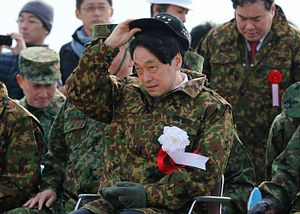The administration of Japan’s Prime Minister Shinzo Abe implemented its long sought-after National Security Council (NSC) last December. The creation of the NSC was surrounded by the release of other security-related documents such as revised National Defense Program Guidelines (NDPG) and a first-ever National Security Strategy (NSS). While the publication of these documents and the creation of the NSC had been planned for several months, their release still set off some alarm bells across the international press and resulted in some predictable cautioning from Beijing, which raised concerns that Japan was returning to its militarist past. Abe’s bold move in visiting Yasukuni shrine, on the anniversary of his first year in office, provided yet another golden opportunity for his detractors to question Japan’s strategic intentions.
The intentions behind the new security apparatus in Tokyo is another debate unto itself. But lost in the furor of this discussion is the actual operations and purpose of Japan’s new centralized approach to national security. Specifically, there seems to be confusion over the newly minted NSC and its role in Japan’s foreign policy – especially with regard to the simmering dispute with China over the Senkaku Islands. As noted in a previous article on the necessity of an NSC in Japan, the concept is not new or merely an outgrowth of souring ties with Beijing. Indeed, during Abe’s first administration in 2007, he proposed legislation that would enact an NSC but the bill was discarded due to unfinished deliberations.
Tokyo has also used other forms of security and defense councils for several decades, but they have been dogged with inefficiencies caused by information silos and bureaucratic red tape. Abe’s failure to procure accurate and timely intelligence during the hostage taking of several Japanese citizens last year in Algeria seemed to mark another tipping point justifying the need for swifter and more centralized national security decisions.
Now that the NSC has finally come into fruition though, questions remain about the nature of its operations as well as its efficiency. The core of the new Council will be its “4-Minister Meeting” (4MM) consisting of the prime minister as chair and assisted by his chief cabinet secretary along with the ministers of Foreign Affairs and Defense. The 4MM style will considerably sharpen the focus of discussions at the NSC and allow the prime minister and his top advisors to more efficiently direct foreign and defense policies regarding national security. The 4MM will also serve as the main engine for serious national security directions such as those surrounding the East China Sea or on the Korean Peninsula.
The former security council in Japan relied on a “Nine Minister’s Meeting” (9MM), which added ministers from a range of other portfolios such as Finance, Public Safety, Internal Affairs, Trade and Transport. The 9MM will continue to meet but will now focus its efforts on the maintenance of the civilian control function for the NSC. The third and final organized meeting will be focused on emergency situations and its make-up will be determined depending on the crisis at hand. Supplementing these series of meetings will be the newly established National Security Secretariat, which is in charge of planning and coordinating efforts and national security as well as preparing for the ministerial meetings. The secretariat will be headed by long-time Abe aide Shotaro Yachi and will consists of a host of seconded bureaucrats and analysts from a range of portfolios including foreign affairs, defense and public safety. The secretariat, along with the 4MM, is the real key to the NSC reforms because it will allow Japan to centralize and improve its analysis of intelligence on national security issues.
One of the most crucial and immediate goals for the new NSC is stronger collaboration with key allies, most importantly the U.S. In this regard, Tokyo has laid forth a busy agenda for Yachi and key secretariat officials with trips to meet counterparts in the U.S., the U.K., Germany, Belgium, France and India. Yachi’s trip to the U.S. earlier this month afforded him a chance to meet with U.S. National Security Advisor Susan Rice and also U.S. Secretaries of Defense and State, Chuck Hagel and John Kerry. Despite the friction over the Yasukuni visit, both sides are likely keen to improve high-level and coordinated security dialogue ahead of their plans to revise bilateral defense cooperation guidelines in the coming year. Moreover, the new secretariat and special advisor position affords Japan another avenue to reach directly into the White House which has been identified as a key priority in Tokyo amidst building strategic anxiety with China. Collaboration between the NSCs adds another layer onto this access at the bureaucratic level as a complement to Caroline Kennedy’s (America’s ambassador to Japan) supposed “direct channel” to U.S. President Barack Obama.
Yet, while all of these changes are welcome, the effectiveness of the nascent NSC remains a lingering question. The bureaucratic red tape and ability to streamline intelligence information remains a daunting obstacle – and one that won’t be conquered easily. Moreover, Tokyo still lacks a foreign intelligence agency that is focused on providing timely intelligence and analysis on national security developments in the region. There is good reason for this as creating such an institution would surely inflame ties with Japan’s neighbours in Northeast Asia still further. However, the lack of such a body might expose vulnerabilities in the NSC in the future, especially in light of dynamic developments in the East China Sea. Another potential hurdle is the recruitment and sustainability of a core of national security and intelligence analysts to serve the secretariat. Currently the secretariat is predominantly staffed by bureaucrats seconded from other ministries, but this approach may be untenable in the long term. The NSC’s ability to evolve its approach over the coming year and remain flexible will be the key to its maturity.

































